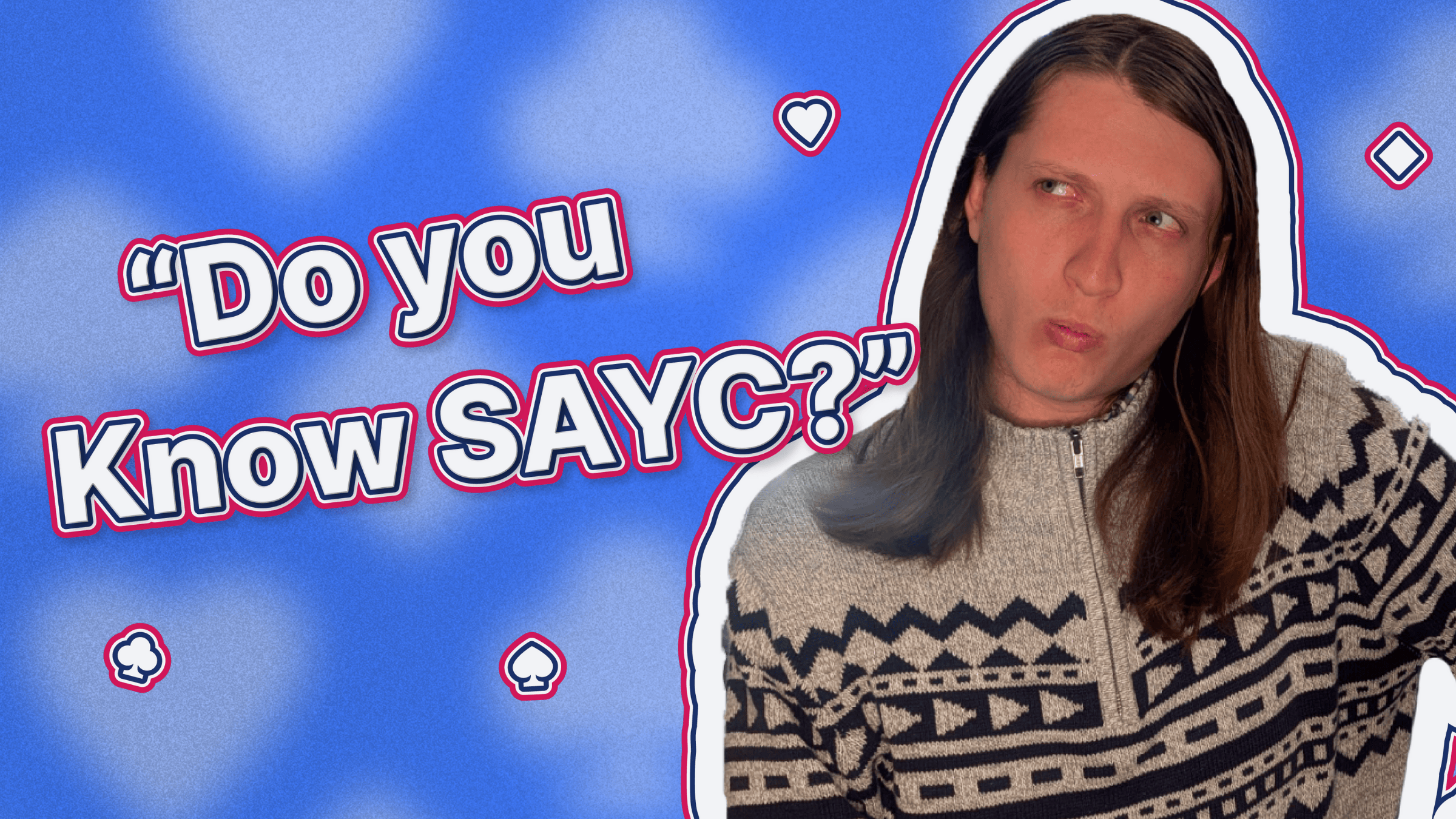


If you missed our first free open lesson in our new video series, Learn with BBO, here's the recording of the lesson. The topic was The Power of Two Suited Overcalls, with special guest Joan Butts, from Australia. This was a video commentary lesson, with the audience asking questions after each board.
The advantage of overcalling with a two-suited hand is that you give partner an idea of your shape early in the bidding. And partner may have a fit for at least one of your suits. If partner has a fit for both, you might make game on very few high-card values. Most modern partnerships have some agreement on how to enter the auction with two-suited hands; two five-card or longer suits.
This is the most popular convention for two-suited hands, and shows anything from a weak hand (8 points ) to a very strong hand (17+). For example, you hold this hand, and your right hand opponent opens 1♦:
♠Q J 10 7 5
♥K Q 10 9 5
♦7
♣86
If you bid spades, you may not be strong enough to later show your hearts because the bidding may become too high. Playing Michaels, bid opener's suit, 2♦. By agreement, this shows both majors.
So, they open 1♣ or 1♦ and you overcall the same suit ie 2♣ or 2♦. This is a Michaels cuebid. With a good fit for one or both suits, partner can compete to the three-level, or even game. Without a good fit, pick your longer major.
If the opponents open a major, (1♥ or 1♠), an overcall of that suit by you (2♥ or 2♠) shows the other major, and one of the minors (which minor is unknown to partner).
A preference to 2♥ or 2♠ shows no interest in-game
A jump to 3♥ or 3♠ is pre-emptive (four trumps)
A jump to 4♥ or 4♠ is to play. Mostly shows a weak hand with a five-card trump suit
When partner uses Michaels over a major suit (ie, overcalls their suit), it shows at least five cards in the other major and an unidentified minor. The responses are similar to those after a minor suit cue bid, with the exception that 2NT now asks for partner’s minor suit.
What does West call on the following hands?
Bid 3♥. East has hearts and a minor. West doesn’t know which minor, but doesn’t care. West knows there’s an eight-card fit in East’s major. With no interest in game, West bids the suit at the cheapest level.
Bid 2NT. Without a fit for the known major suit, West bids 2NT to find out which minor suit East holds. West hopes it’s clubs, but intends to pass whichever suit East bids.
It is rare that an overcaller would bid 2NT to show a balanced 20-21 points when the opponents open the bidding, so 2NT is used to describe two-suited hands. So, a jump to 2NT over an opening bid of one-of-a-suit shows at least five cards in each of the two lower-ranking unbid suits. (Over major openings, it shows the minors, over 1♣ it shows diamonds and hearts, and over 1♦ it shows hearts and clubs, i.e. the lower unbid suits).
A simple preference to one of partner’s suit shows no interest in game.
A jump in one of the suits is weak and pre-emptive.
A jump to the game level could be weak or strong.
3NT is to play, and so is a new suit bid naturally.
Here are some examples after East opens the bidding 1♥, and North-South are non-vulnerable:
♠4
♥3
♦Q J 9 8 4
♣K 10 9 8 6 3
Bid 2NT. Shows a weak, distributional hand. It is a competitive bid, suggesting a possible sacrifice against the opponent’s contract. Here South doesn’t have enough to overcall 2♣, and an overcall of 1♦ might get the partnership to the wrong suit. A jump to 2NT asks partner to choose between clubs and diamonds, the two lower-ranking unbid suits.
♠ 3
♥ -
♦ A Q J 8 7 3
♣ A K J 8 5 2
Bid 2NT. The unusual notrump may also be used with a very strong hand where you plan to bid again. Once partner bids a minor, South intends to raise to game. If the opponents get in the way, South will double or show a strong hand.
Michaels Cue bids are also played in the balancing seat, e.g. 1♥ p p 2♥ shows five+ spades and a five+ card minor.
It’s also possible to play Michaels over weak two-bids, e.g. 2♥ (3♥ overcall), but some like to play “Leaping Michaels” which shows the actual minor you hold as well as the known major and must be strong because it forces partner to bid at the four-level e.g. 2♥ (4♣ overcall would show five + spades and five + clubs). Discuss with partner.
Joan Butts is a well-known bridge personality who's represented Australia and taught thousands of people to play. She owns a bridge club and has a passion for bridge education.
In 2011, Joan was appointed the Australian Bridge Federation’s National Teaching Coordinator. In this capacity she trains teachers, introducing them to the latest methods in bridge education, and creating and running professional development programmes.




Thanks for the very clear and concise lesson.
Extremely good. Thanks Joan for a wonderful display of extra ordinary skills.
Thank you, Joan, for these interesting and informative lessons!
Hope you won't mind a comment/suggestion. It would be most helpful if the BBO screen image would sync with the commentary. Most often, the screen image is ahead of the voice commentary by at least one trick, so one cannot see the cards/hands/tricks as they are being descibed. It's hard to follow.
Am I the only one having this issue?
very clear explanation of the 2
I have join you for the 1st time.how do you down load do your instruction so I can print them off
thank you for a clear concise interesting lesson!
Thanks so much for your feedback. I'll be there again this week for the Fourth Suit Forcing Convention. BBO are trying and so am I to make the cards and my voice "talk" together. Cheers Joan Butts
What a great idea and lesson. Love this format. I got off base after a few hands and was not in cinque with words on video and my voice, but I listened to the play by play.
I hope to join in another lesson and not touch a thing.
Thanks again.
CB
Thank you for such a clear lesson with a clear voice. Well done.
Thanks joan for the lesson